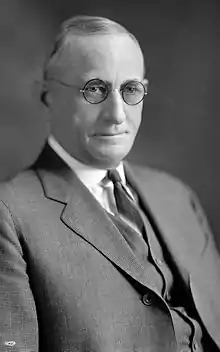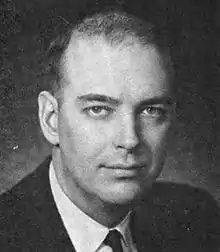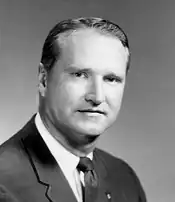| Kansas's 3rd congressional district | |||
|---|---|---|---|
Interactive map of district boundaries since January 3, 2023 | |||
| Representative |
| ||
| Distribution |
| ||
| Population (2022) | 741,829 | ||
| Median household income | $91,626[1] | ||
| Ethnicity |
| ||
| Cook PVI | R+1[2] | ||
Kansas's 3rd congressional district is a congressional district in the U.S. state of Kansas. Located in eastern Kansas, the district encompasses all of Anderson, Franklin, Johnson and Miami counties and parts of Wyandotte County. The district includes most of the Kansas side of the Kansas City metropolitan area, including all of Overland Park, Leawood, Lenexa, Shawnee, Gardner, and Olathe and parts of Kansas City.
The 3rd district is represented by Democrat Sharice Davids, who was first elected in 2018, defeating Republican incumbent Kevin Yoder. Reapportionment in 2022 altered the district's boundaries to add Anderson and Franklin counties and the part of Miami County that was not already in the 3rd congressional district. The southern part of Wyandotte County roughly along I-70 stayed in the district, while the area north of I-70 moved to the 2nd congressional district. With a Cook Partisan Voting Index rating of R+1, it is only Kansas district that is not heavily Republican.[2]
History
2000 demographics
Following redistricting after the 2000 U.S. census,[3] there were 672,124 people, 258,439 households, and 173,022 families residing in the district. The population density was 864.4/mi2 over a land area of 778 square miles (2,020 km2). There were 272,721 housing units at an average density of 350.7/mi2. The racial makeup of the district is 82.70% White, 8.88% Black or African American, 2.60% Asian, 0.70% Native American, 0.04% Pacific Islander, 3.09% from other races, and 1.99% from two or more races. Hispanic or Latino of any race were 6.79% of the population.
There were 258,439 households, out of which 36.52% had children under the age of 18 living with them, 53.21% were married couples living together, 10.27% had a female householder with no husband present, and 33.05% were non-families. 26.12% of all households were made up of individuals, and 7.35% had someone living alone who was 65 years of age or older. The average household size was 2.55 and the average family size was 3.11.
In the district, the population distribution by age is 26.60% under the age of 18, 10.49% from 18 to 24, 31.65% from 25 to 44, 21.17% from 45 to 64, and 10.09% who were 65 years of age or older. The median age was 33.6 years. For every 100 females there were 95.78 males. For every 100 females age 18 and over, there were 92.54 males.
The median income for a household in the district is $51,118, and the median income for a family was $62,695. Males had a median income of $42,348 versus $30,353 for females. The per capita income for the district was $26,133. About 4.9% of families and 7.8% of the population were below the poverty line, including 8.7% of those under age 18 and 6.0% of those age 65 or over.
Among the population aged 16 years and older, 71.0% were in the civilian labor force and 0.1% were in the armed forces. Of the employed civilian workers, 12.8% were government workers and 5.6% were self-employed. Management, professional, and related occupations employed 41.5% of the workforce, and sales and office occupations an additional 28.8%. Only 0.2% were employed in farming, fishing, and forestry occupations. The largest employment by industry was: educational, health, and social services, 19.8%; professional, scientific, management, administrative, and waste management services, 12.0%; retail trade, 11.8%; and manufacturing, 10.4%. Agriculture, forestry, fishing and hunting, and mining industries only employed 0.4%.
The district's character is very different from the rest of Kansas, largely due to the influence of Kansas City and its suburbs. While Kansas's other congressional districts include significant rural territory, the 3rd is almost exclusively urban and suburban. As such, it is much friendlier to Democrats than the rest of the state. It was the only district in Kansas carried by Democrats in 2008, 2016, and 2020. The largest county, Johnson, has traditionally leaned Republican, though the brand of Republicanism practiced in the county has traditionally been a moderate one. The second-largest, Wyandotte, has long been one of the most Democratic counties in the state.
2020 redistricting
In recent years, as Eastern Kansas began to grow exponentially, the population has also increased, and has been voting more reliably Democratic. This led to Republican members of the Kansas House of Representatives and Kansas State Senate trying to gerrymander the district maps into reliably Republican, with growing fears that Democrats could win a second seat by 2026 if they did not take action. Several skewed maps were attempted to be passed, but were not able to be passed due to a veto from the Democratic governor Laura Kelly. A less aggressive map was passed by the Kansas Legislature after several maps were vetoed, but critics say this map split notably Democratic Wyandotte County and separates it from Shawnee County, a county more closer regionally and demographically to Wyandotte County, for the purpose of removing Rep. Sharice Davids from her seat in the House. Nevertheless, Davids carried the seat in 2022, after the map took effect.
List of members representing the district
Recent statewide election results
Results under current lines (since 2023)
| Year | Office | Results |
|---|---|---|
| 2012 | President | Mitt Romney 57% - Barack Obama 40% |
| 2016 | President | Donald Trump 48% - Hillary Clinton 43% |
| 2018 | Governor | Laura Kelly 54% - Kris Kobach 39% |
| 2020 | President | Joe Biden 51% - Donald Trump 47% |
| 2020 | Senate | Barbara Bollier 50% - Roger Marshall 45% |
Recent election results
2002
| Party | Candidate | Votes | % | |
|---|---|---|---|---|
| Democratic | Dennis Moore (incumbent) | 107,931 | 50.16 | |
| Republican | Adam Taff | 100,999 | 46.93 | |
| Reform | Dawn Bly | 4,934 | 2.29 | |
| Libertarian | Doug Martin | 1,328 | 0.62 | |
| Total votes | 215,192 | 100.00 | ||
| Turnout | ||||
| Democratic hold | ||||
2004
| Party | Candidate | Votes | % | |
|---|---|---|---|---|
| Democratic | Dennis Moore (incumbent) | 184,050 | 54.82 | |
| Republican | Kris Kobach | 145,542 | 43.35 | |
| Libertarian | Joe Bellis | 3,191 | 0.95 | |
| Reform | Richard Wells | 2,956 | 0.88 | |
| Total votes | 335,739 | 100.00 | ||
| Turnout | ||||
| Democratic hold | ||||
2006
| Party | Candidate | Votes | % | |
|---|---|---|---|---|
| Democratic | Dennis Moore (incumbent) | 149,480 | 64.47 | |
| Republican | Chuck Ahner | 78,446 | 33.84 | |
| Reform | Robert A. Conroy | 3,925 | 1.69 | |
| Total votes | 231,851 | 100.00 | ||
| Turnout | ||||
| Democratic hold | ||||
2008
| Party | Candidate | Votes | % | |
|---|---|---|---|---|
| Democratic | Dennis Moore (incumbent) | 202,541 | 56.44 | |
| Republican | Nick Jordan | 142,307 | 39.66 | |
| Libertarian | Joe Bellis | 10,073 | 2.81 | |
| Reform | Roger Tucker | 3,937 | 1.10 | |
| Total votes | 358,858 | 100.00 | ||
| Turnout | ||||
| Democratic hold | ||||
2010
| Party | Candidate | Votes | % | |||
|---|---|---|---|---|---|---|
| Republican | Kevin Yoder | 136,246 | 58.40 | |||
| Democratic | Stephene Moore | 90,193 | 38.66 | |||
| Libertarian | Jasmin Talbert | 6,846 | 2.94 | |||
| Total votes | 233,285 | 100.00 | ||||
| Turnout | ||||||
| Republican gain from Democratic | ||||||
2012
| Party | Candidate | Votes | % | |
|---|---|---|---|---|
| Republican | Kevin Yoder (incumbent) | 201,087 | 68.5 | |
| Libertarian | Joel Balam | 92,675 | 31.5 | |
| Total votes | 293,762 | 100 | ||
| Republican hold | ||||
2014
| Party | Candidate | Votes | % | |
|---|---|---|---|---|
| Republican | Kevin Yoder (incumbent) | 134,493 | 60.02 | |
| Democratic | Kelly Kultala | 89,584 | 39.98 | |
| Total votes | 224,077 | 100 | ||
| Republican hold | ||||
2016
| Party | Candidate | Votes | % | |
|---|---|---|---|---|
| Republican | Kevin Yoder (incumbent) | 176,022 | 51.3 | |
| Democratic | Jay Sidie | 139,300 | 40.6 | |
| Libertarian | Steve Hohe | 27,791 | 8.1 | |
| Total votes | 343,113 | 100 | ||
| Republican hold | ||||
2018
| Party | Candidate | Votes | % | |||
|---|---|---|---|---|---|---|
| Democratic | Sharice Davids | 164,253 | 53.3 | |||
| Republican | Kevin Yoder (incumbent) | 136,104 | 44.2 | |||
| Libertarian | Chris Clemmons | 7,643 | 2.5 | |||
| Total votes | 308,000 | 100 | ||||
| Democratic gain from Republican | ||||||
2020
| Party | Candidate | Votes | % | ||
|---|---|---|---|---|---|
| Democratic | Sharice Davids (incumbent) | 220,049 | 53.6 | ||
| Republican | Amanda Adkins | 178,773 | 43.6 | ||
| Libertarian | Steven Hohe | 11,596 | 2.8 | ||
| Total votes | 410,418 | 100 | |||
| Democratic hold | |||||
2022
| Party | Candidate | Votes | % | |
|---|---|---|---|---|
| Democratic | Sharice Davids (incumbent) | 165,527 | 54.9 | |
| Republican | Amanda Adkins | 128,839 | 42.8 | |
| Libertarian | Steve Hohe | 6,928 | 2.3 | |
| Total votes | 301,294 | 100 | ||
| Democratic hold | ||||
Historical district boundaries

.tif.png.webp)
See also
References
- ↑ Center for New Media & Promotion (CNMP), US Census Bureau. "My Congressional District". www.census.gov.
- 1 2 "2022 Cook PVI: District Map and List". Cook Political Report. Retrieved January 10, 2023.
- ↑ "U.S. Census website". United States Census Bureau. Retrieved January 31, 2008.
.svg.png.webp)



.jpg.webp)
.jpg.webp)
.jpg.webp)

.jpg.webp)
.jpg.webp)


_2.jpg.webp)

.jpg.webp)
.jpg.webp)
.png.webp)



.jpg.webp)



.tif.png.webp)

.svg.png.webp)